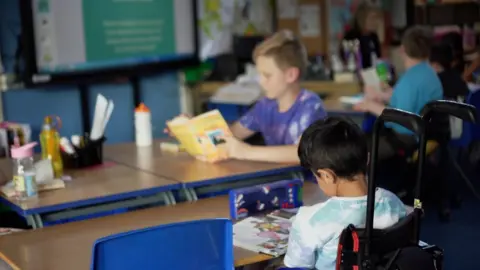Hundreds of special needs pupils 'squeezed' out of school
More than 1,500 children with special educational needs and disabilities (Send) are without a school place in England, with some waiting up to two years for provision.
The figures, collated by Newsnight, cover 46 English councils (25%), which suggests the real figure may be higher.
One mother told the programme her son had been "squeezed out" of school as a "quick cost-cutting solution".
The government said responsibility lay with local authorities.
Local authorities do not routinely publish data but a series of Freedom of Information requests made over the past six months show 1,580 children with education and health care plans (EHCPs), which used to be called statements of special educational needs, have no education provision.
The highest numbers came from Kent (348) and Surrey (93).
Alex Palmer, six, who has autism, has not had a school place for two years, having been excluded just weeks after starting at a mainstream school in 2017.
"It just became too overwhelming for Alex and within five days of being at school full time, I had that that phone call that I knew was coming... there's issues and that ultimately your son is facing exclusion," his mother, Rachel, said.
"Alex shut down completely. He used to write his name and draw and paint and then following how emotionally traumatic he felt that experience was… he wouldn't hold a pencil, he wouldn't write".

And children such as Alex could be just the tip of the iceberg. They are the ones who have an EHCP - but not all children with Send do.
Last year, there were more than 285,000 children with EHCPs in England - but the number of Send children is higher.
Parents can spend months, or even years, trying to get their child assessed for an EHCP and in the meantime there is no statutory requirement for local authorities to keep a register of these children.
In Birmingham, where Alex and Rachel live, a Freedom of Information request revealed 66 children with EHCPs were without education provision- but sources told the BBC's Newsnight programme there were actually about 250 Send children waiting for a school place. Birmingham Council said it did not "recognise" this latter figure.
The Children's Commissioner for England, Anne Longfield, was not surprised by the numbers across England.
"They reaffirm my concern that this is actually really widespread and there's a lot of children in this situation… lots of children and parents I've met who are spending 18 months, two years looking for that right school, or pinballing between applications to different schools," she said.
'We're full'
Send provision is split between specialist and mainstream schools.
Earlier this year, the government announced an additional £250m to support high needs and an extra £100m for new special school places - but the Institute for Fiscal Studies estimates the funding gap for Send education will hit £1.6bn by 2021.
Charlotte Stubbs, the head teacher at Uffculme Special School, in Birmingham, which supports children on the autistic spectrum, said: "This year, we had 19 spaces available for September 2019 [in Year 7] - we had 86 requests for placement.
"In our primary provision, specifically at Years 1 and 2, the class sizes are about seven or eight pupils per class size.
"We've had 130 referrals for primary placements this year and we're full".
Send places at mainstream schools are also coming under pressure.
The first £6,000 of support for a Send child has to come from the school's core budget and, put simply, pupils who need specialist help typically cost more than the funding they bring in.

Schools such as Kings Heath Primary, in Birmingham, which has a high proportion of pupils with complex needs, have long subsidised Send support from other parts of the budget. But because of financial pressure, they may have to close places for pupils such as Aaron.
"We don't want this to happen," the 10-year-old told Newsnight. "If this doesn't stop, then people will get split up from each other, friendships will be broken and I really don't want that to happen, because I like my school and what it's doing for me."
The Department for Education said EHCPs had meant more than a quarter of a million children with complex educational needs "are receiving the tailored support they need to thrive".
"We know that a number of children with EHC plans are waiting for a place in school, having moved to a new local authority area, or waiting for their first primary school place," a spokesman said.
"Local authorities are responsible for ensuring that there are sufficient school places for all children in their local area.
"We encourage local authorities and providers to work collaboratively so the right range of provision is available for children."
